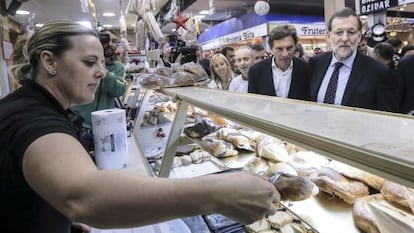Parties intensify their attacks as polls show a tight race
PM announces he will eliminate income tax for those who work beyond 65 if re-elected


With recent polls pointing to a tight race and a large number of undecided voters (about 40%), Spain’s main general election candidates have been stepping up their personal attacks against each another.
Even Prime Minister Mariano Rajoy, who is campaigning to win a second term in the December 20 race, has increased his criticism against the candidate who, at least in theory, is his principal rival, Pedro Sánchez of the Socialist Party – although on Wednesday the Popular Party (PP) leader appeared to back off slightly ahead of Monday’s televised debate.
The tight situation has made candidates nervous to the point that the personal attacks have begun overshadowing the proposals
The PP is expected to win the race, but by a small margin, according to voting intention surveys.
Emerging parties Ciudadanos, whose popularity has climbed in recent polls, and anti-austerity grouping Podemos have also ganged up on Sánchez, in the hope of taking second place in the race.
A poll released by the state-funded Center for Sociological Research (CIS) last week and the daily tracking carried out by the larger parties show that Sánchez and Albert Rivera of Ciudadanos are on almost equal footing with only a short gap between them and the PP in first place.
With just 10 days to go before Spaniards head to the polls, the tight situation has made candidates nervous to the point that the personal attacks have begun overshadowing the proposals.
It is not usual to hear Rajoy pointedly asking the Socialists to stay calm and start reflecting on how they will need to start reorganizing after the election.
But at a campaign event in Palma de Mallorca on Wednesday, Rajoy told reporters that he did want “to get involved in anybody else’s troubles” when he criticized Sánchez’s leadership, and suggested there “could be a surprise on December 20.”
On Thursday, Rajoy used an interview with state broadcaster TVE to announce a major new campaign promise, saying he would eliminate personal income tax (IRPF) for those who continue to work beyond the age of 65 if he is re-elected. At the same time, he would also exempt those starting out in their first job from paying income tax in the first year. In both cases there would be limits for those earning exorbitant salaries, though he failed to specify what those would be.
Rajoy has said he has begun preparing for his one-on-one TV debate with Sánchez on Monday and that he wants to demonstrate to Spaniards that he is the candidate most capable of serving as prime minister.
At the same time, Sánchez is seeking to make it clear that he is the only alternative to Rajoy who can offer real change.
The PP has said its own polls show that Rajoy is leading with 28% of the vote while the Socialists, Ciudadanos and Podemos are in a near three-way tie for second place with close to 20% each.
While the recent CIS poll does not reflect this and puts Podemos far behind the Socialists and Ciudadanos, the findings may be responsible for the parties’ sudden change in strategies.
Rajoy said he would also exempt those starting their first job from paying income tax in the first year
During last Monday’s debate, Ciudadanos leader Albert Rivera and Podemos secretary general Pablo Iglesias concentrated most of their attacks on Sánchez rather than Deputy Prime Minister Soraya Sáenz de Santamaría – who was representing the PP in place of Rajoy – except in the section on corruption.
In an interview on RNE state radio, Sáenz de Santamaría said that Sánchez offered “a weak message.”
“I don’t see this turning out good for him because he has become hostage to his own erroneous decisions and [past political] pacts are coming back to haunt him,” she said.
Iglesias also said that he believed that the Socialists were going through “a difficult moment.”
English version by Martin Delfín.
Tu suscripción se está usando en otro dispositivo
¿Quieres añadir otro usuario a tu suscripción?
Si continúas leyendo en este dispositivo, no se podrá leer en el otro.
FlechaTu suscripción se está usando en otro dispositivo y solo puedes acceder a EL PAÍS desde un dispositivo a la vez.
Si quieres compartir tu cuenta, cambia tu suscripción a la modalidad Premium, así podrás añadir otro usuario. Cada uno accederá con su propia cuenta de email, lo que os permitirá personalizar vuestra experiencia en EL PAÍS.
En el caso de no saber quién está usando tu cuenta, te recomendamos cambiar tu contraseña aquí.
Si decides continuar compartiendo tu cuenta, este mensaje se mostrará en tu dispositivo y en el de la otra persona que está usando tu cuenta de forma indefinida, afectando a tu experiencia de lectura. Puedes consultar aquí los términos y condiciones de la suscripción digital.









































